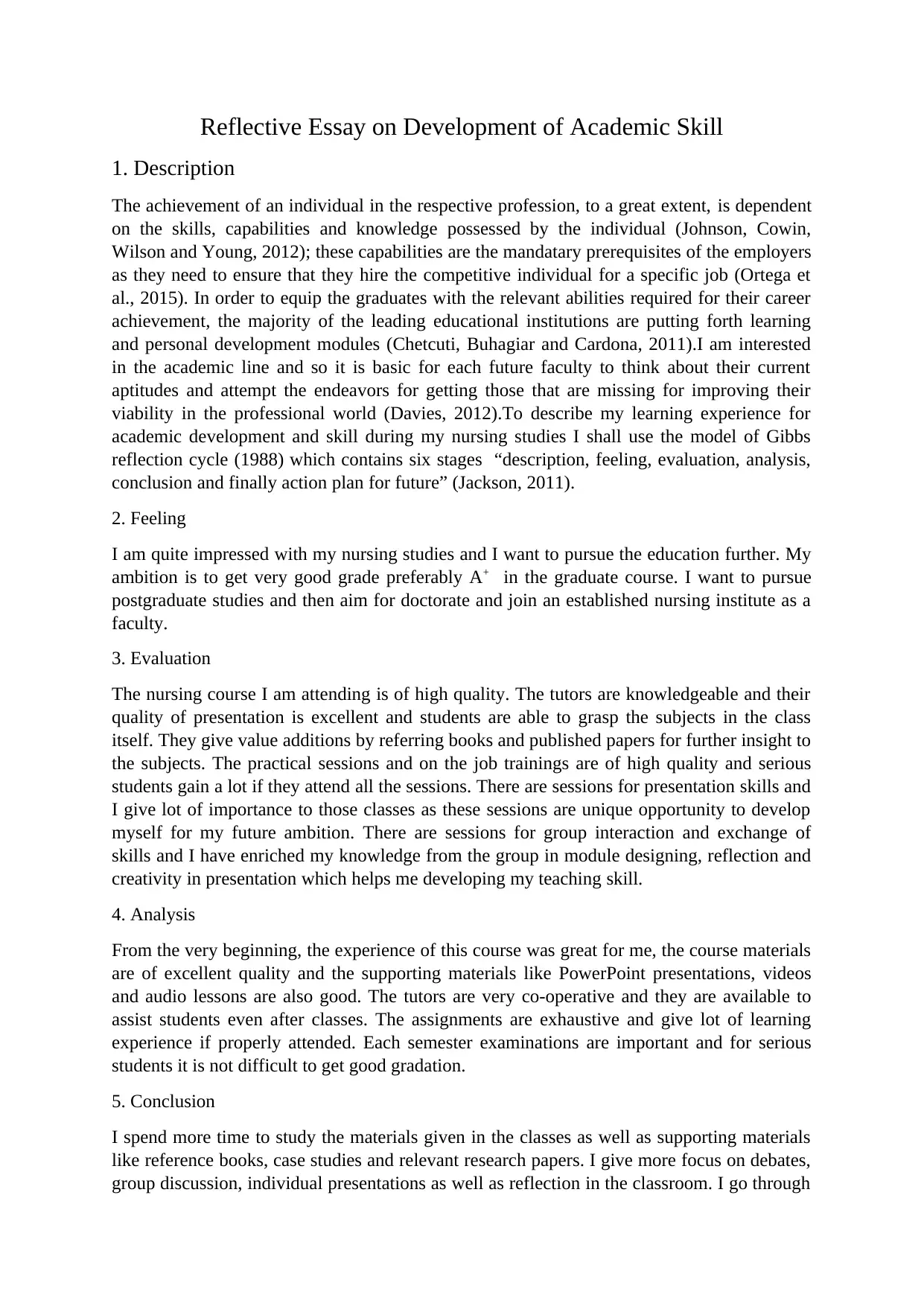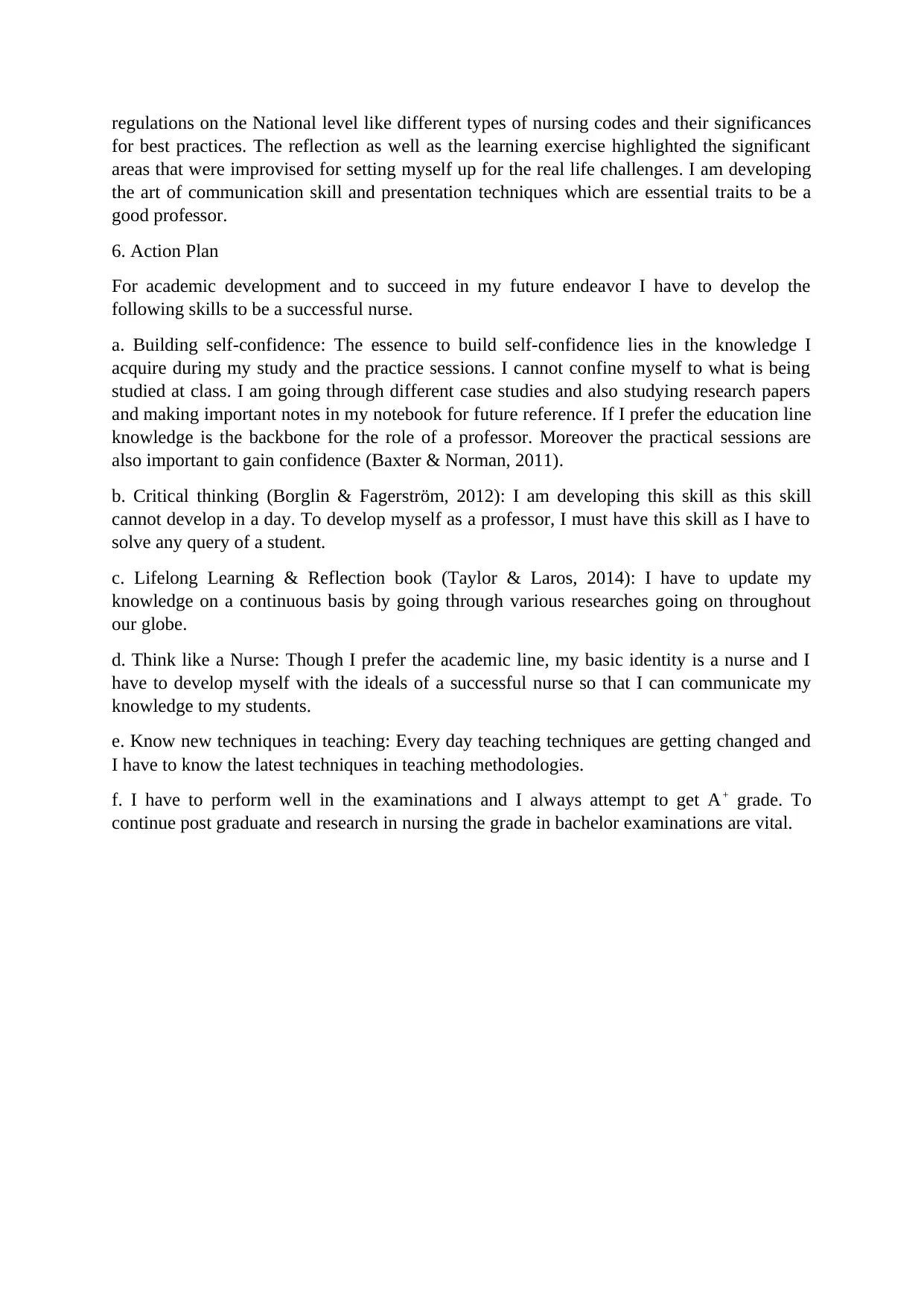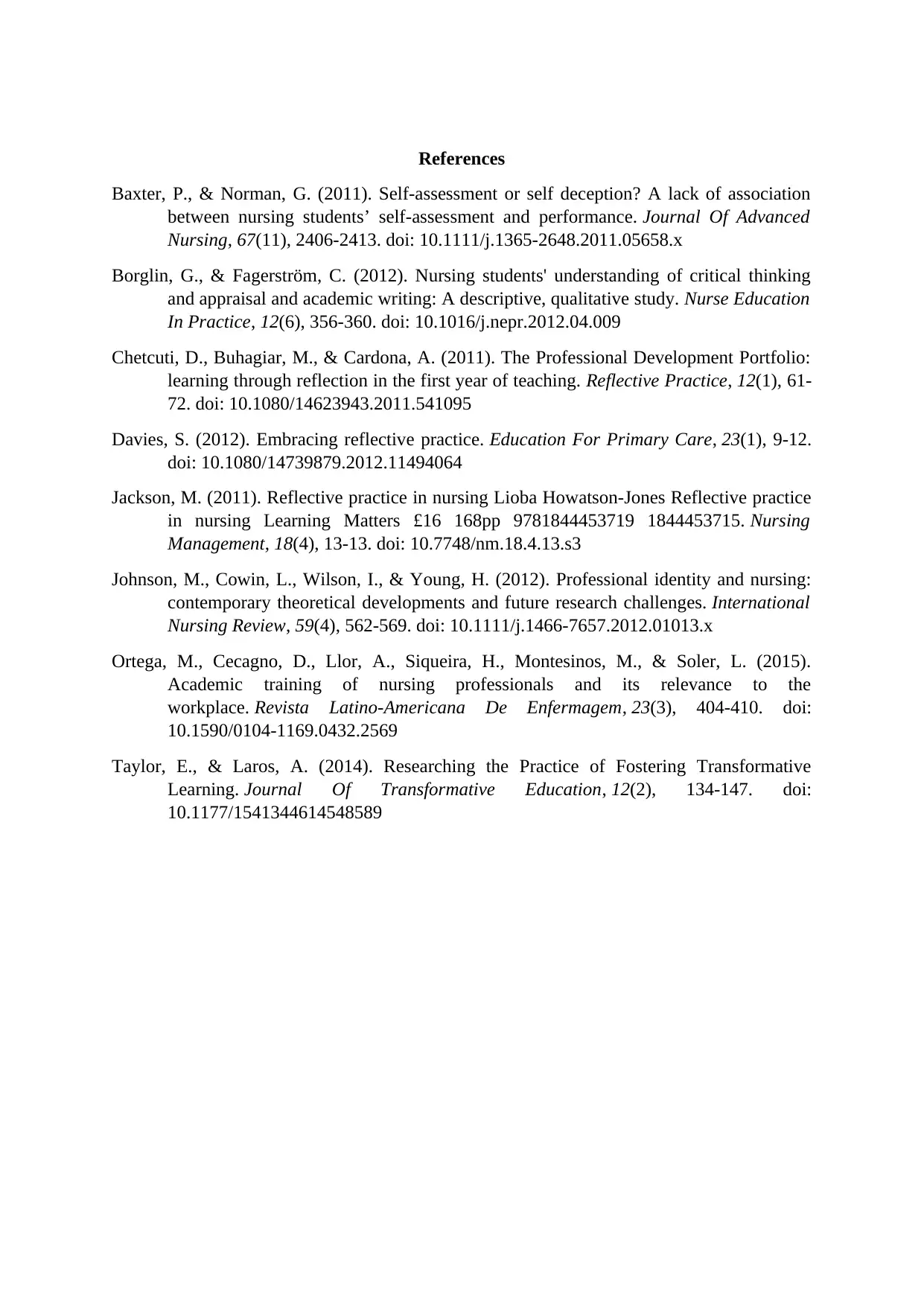Academic Skill Development: A Reflective Essay on Nursing Studies
VerifiedAdded on 2023/01/03
|3
|1268
|79
Essay
AI Summary
This reflective essay details a student's journey in developing academic skills during nursing studies. The essay utilizes Gibbs' reflective cycle to describe the learning experience, feelings, evaluations, and analysis of the course. The student expresses a strong ambition to excel academically, aiming for postgraduate studies and a career in academia. The evaluation highlights the high quality of the nursing program, including knowledgeable tutors, effective practical sessions, and opportunities for skill development. Analysis reveals the value of course materials and tutor support. The conclusion emphasizes the importance of continuous learning and self-improvement. Finally, the action plan outlines specific strategies for building self-confidence, developing critical thinking skills, embracing lifelong learning, and mastering teaching techniques, all crucial for achieving the goal of becoming a successful nursing faculty member. The essay references several academic papers to support the student's reflections and plans for future development.

Reflective Essay on Development of Academic Skill
1. Description
The achievement of an individual in the respective profession, to a great extent, is dependent
on the skills, capabilities and knowledge possessed by the individual (Johnson, Cowin,
Wilson and Young, 2012); these capabilities are the mandatary prerequisites of the employers
as they need to ensure that they hire the competitive individual for a specific job (Ortega et
al., 2015). In order to equip the graduates with the relevant abilities required for their career
achievement, the majority of the leading educational institutions are putting forth learning
and personal development modules (Chetcuti, Buhagiar and Cardona, 2011).I am interested
in the academic line and so it is basic for each future faculty to think about their current
aptitudes and attempt the endeavors for getting those that are missing for improving their
viability in the professional world (Davies, 2012).To describe my learning experience for
academic development and skill during my nursing studies I shall use the model of Gibbs
reflection cycle (1988) which contains six stages “description, feeling, evaluation, analysis,
conclusion and finally action plan for future” (Jackson, 2011).
2. Feeling
I am quite impressed with my nursing studies and I want to pursue the education further. My
ambition is to get very good grade preferably A+ in the graduate course. I want to pursue
postgraduate studies and then aim for doctorate and join an established nursing institute as a
faculty.
3. Evaluation
The nursing course I am attending is of high quality. The tutors are knowledgeable and their
quality of presentation is excellent and students are able to grasp the subjects in the class
itself. They give value additions by referring books and published papers for further insight to
the subjects. The practical sessions and on the job trainings are of high quality and serious
students gain a lot if they attend all the sessions. There are sessions for presentation skills and
I give lot of importance to those classes as these sessions are unique opportunity to develop
myself for my future ambition. There are sessions for group interaction and exchange of
skills and I have enriched my knowledge from the group in module designing, reflection and
creativity in presentation which helps me developing my teaching skill.
4. Analysis
From the very beginning, the experience of this course was great for me, the course materials
are of excellent quality and the supporting materials like PowerPoint presentations, videos
and audio lessons are also good. The tutors are very co-operative and they are available to
assist students even after classes. The assignments are exhaustive and give lot of learning
experience if properly attended. Each semester examinations are important and for serious
students it is not difficult to get good gradation.
5. Conclusion
I spend more time to study the materials given in the classes as well as supporting materials
like reference books, case studies and relevant research papers. I give more focus on debates,
group discussion, individual presentations as well as reflection in the classroom. I go through
1. Description
The achievement of an individual in the respective profession, to a great extent, is dependent
on the skills, capabilities and knowledge possessed by the individual (Johnson, Cowin,
Wilson and Young, 2012); these capabilities are the mandatary prerequisites of the employers
as they need to ensure that they hire the competitive individual for a specific job (Ortega et
al., 2015). In order to equip the graduates with the relevant abilities required for their career
achievement, the majority of the leading educational institutions are putting forth learning
and personal development modules (Chetcuti, Buhagiar and Cardona, 2011).I am interested
in the academic line and so it is basic for each future faculty to think about their current
aptitudes and attempt the endeavors for getting those that are missing for improving their
viability in the professional world (Davies, 2012).To describe my learning experience for
academic development and skill during my nursing studies I shall use the model of Gibbs
reflection cycle (1988) which contains six stages “description, feeling, evaluation, analysis,
conclusion and finally action plan for future” (Jackson, 2011).
2. Feeling
I am quite impressed with my nursing studies and I want to pursue the education further. My
ambition is to get very good grade preferably A+ in the graduate course. I want to pursue
postgraduate studies and then aim for doctorate and join an established nursing institute as a
faculty.
3. Evaluation
The nursing course I am attending is of high quality. The tutors are knowledgeable and their
quality of presentation is excellent and students are able to grasp the subjects in the class
itself. They give value additions by referring books and published papers for further insight to
the subjects. The practical sessions and on the job trainings are of high quality and serious
students gain a lot if they attend all the sessions. There are sessions for presentation skills and
I give lot of importance to those classes as these sessions are unique opportunity to develop
myself for my future ambition. There are sessions for group interaction and exchange of
skills and I have enriched my knowledge from the group in module designing, reflection and
creativity in presentation which helps me developing my teaching skill.
4. Analysis
From the very beginning, the experience of this course was great for me, the course materials
are of excellent quality and the supporting materials like PowerPoint presentations, videos
and audio lessons are also good. The tutors are very co-operative and they are available to
assist students even after classes. The assignments are exhaustive and give lot of learning
experience if properly attended. Each semester examinations are important and for serious
students it is not difficult to get good gradation.
5. Conclusion
I spend more time to study the materials given in the classes as well as supporting materials
like reference books, case studies and relevant research papers. I give more focus on debates,
group discussion, individual presentations as well as reflection in the classroom. I go through
Paraphrase This Document
Need a fresh take? Get an instant paraphrase of this document with our AI Paraphraser

regulations on the National level like different types of nursing codes and their significances
for best practices. The reflection as well as the learning exercise highlighted the significant
areas that were improvised for setting myself up for the real life challenges. I am developing
the art of communication skill and presentation techniques which are essential traits to be a
good professor.
6. Action Plan
For academic development and to succeed in my future endeavor I have to develop the
following skills to be a successful nurse.
a. Building self-confidence: The essence to build self-confidence lies in the knowledge I
acquire during my study and the practice sessions. I cannot confine myself to what is being
studied at class. I am going through different case studies and also studying research papers
and making important notes in my notebook for future reference. If I prefer the education line
knowledge is the backbone for the role of a professor. Moreover the practical sessions are
also important to gain confidence (Baxter & Norman, 2011).
b. Critical thinking (Borglin & Fagerström, 2012): I am developing this skill as this skill
cannot develop in a day. To develop myself as a professor, I must have this skill as I have to
solve any query of a student.
c. Lifelong Learning & Reflection book (Taylor & Laros, 2014): I have to update my
knowledge on a continuous basis by going through various researches going on throughout
our globe.
d. Think like a Nurse: Though I prefer the academic line, my basic identity is a nurse and I
have to develop myself with the ideals of a successful nurse so that I can communicate my
knowledge to my students.
e. Know new techniques in teaching: Every day teaching techniques are getting changed and
I have to know the latest techniques in teaching methodologies.
f. I have to perform well in the examinations and I always attempt to get A+ grade. To
continue post graduate and research in nursing the grade in bachelor examinations are vital.
for best practices. The reflection as well as the learning exercise highlighted the significant
areas that were improvised for setting myself up for the real life challenges. I am developing
the art of communication skill and presentation techniques which are essential traits to be a
good professor.
6. Action Plan
For academic development and to succeed in my future endeavor I have to develop the
following skills to be a successful nurse.
a. Building self-confidence: The essence to build self-confidence lies in the knowledge I
acquire during my study and the practice sessions. I cannot confine myself to what is being
studied at class. I am going through different case studies and also studying research papers
and making important notes in my notebook for future reference. If I prefer the education line
knowledge is the backbone for the role of a professor. Moreover the practical sessions are
also important to gain confidence (Baxter & Norman, 2011).
b. Critical thinking (Borglin & Fagerström, 2012): I am developing this skill as this skill
cannot develop in a day. To develop myself as a professor, I must have this skill as I have to
solve any query of a student.
c. Lifelong Learning & Reflection book (Taylor & Laros, 2014): I have to update my
knowledge on a continuous basis by going through various researches going on throughout
our globe.
d. Think like a Nurse: Though I prefer the academic line, my basic identity is a nurse and I
have to develop myself with the ideals of a successful nurse so that I can communicate my
knowledge to my students.
e. Know new techniques in teaching: Every day teaching techniques are getting changed and
I have to know the latest techniques in teaching methodologies.
f. I have to perform well in the examinations and I always attempt to get A+ grade. To
continue post graduate and research in nursing the grade in bachelor examinations are vital.

References
Baxter, P., & Norman, G. (2011). Self-assessment or self deception? A lack of association
between nursing students’ self-assessment and performance. Journal Of Advanced
Nursing, 67(11), 2406-2413. doi: 10.1111/j.1365-2648.2011.05658.x
Borglin, G., & Fagerström, C. (2012). Nursing students' understanding of critical thinking
and appraisal and academic writing: A descriptive, qualitative study. Nurse Education
In Practice, 12(6), 356-360. doi: 10.1016/j.nepr.2012.04.009
Chetcuti, D., Buhagiar, M., & Cardona, A. (2011). The Professional Development Portfolio:
learning through reflection in the first year of teaching. Reflective Practice, 12(1), 61-
72. doi: 10.1080/14623943.2011.541095
Davies, S. (2012). Embracing reflective practice. Education For Primary Care, 23(1), 9-12.
doi: 10.1080/14739879.2012.11494064
Jackson, M. (2011). Reflective practice in nursing Lioba Howatson-Jones Reflective practice
in nursing Learning Matters £16 168pp 9781844453719 1844453715. Nursing
Management, 18(4), 13-13. doi: 10.7748/nm.18.4.13.s3
Johnson, M., Cowin, L., Wilson, I., & Young, H. (2012). Professional identity and nursing:
contemporary theoretical developments and future research challenges. International
Nursing Review, 59(4), 562-569. doi: 10.1111/j.1466-7657.2012.01013.x
Ortega, M., Cecagno, D., Llor, A., Siqueira, H., Montesinos, M., & Soler, L. (2015).
Academic training of nursing professionals and its relevance to the
workplace. Revista Latino-Americana De Enfermagem, 23(3), 404-410. doi:
10.1590/0104-1169.0432.2569
Taylor, E., & Laros, A. (2014). Researching the Practice of Fostering Transformative
Learning. Journal Of Transformative Education, 12(2), 134-147. doi:
10.1177/1541344614548589
Baxter, P., & Norman, G. (2011). Self-assessment or self deception? A lack of association
between nursing students’ self-assessment and performance. Journal Of Advanced
Nursing, 67(11), 2406-2413. doi: 10.1111/j.1365-2648.2011.05658.x
Borglin, G., & Fagerström, C. (2012). Nursing students' understanding of critical thinking
and appraisal and academic writing: A descriptive, qualitative study. Nurse Education
In Practice, 12(6), 356-360. doi: 10.1016/j.nepr.2012.04.009
Chetcuti, D., Buhagiar, M., & Cardona, A. (2011). The Professional Development Portfolio:
learning through reflection in the first year of teaching. Reflective Practice, 12(1), 61-
72. doi: 10.1080/14623943.2011.541095
Davies, S. (2012). Embracing reflective practice. Education For Primary Care, 23(1), 9-12.
doi: 10.1080/14739879.2012.11494064
Jackson, M. (2011). Reflective practice in nursing Lioba Howatson-Jones Reflective practice
in nursing Learning Matters £16 168pp 9781844453719 1844453715. Nursing
Management, 18(4), 13-13. doi: 10.7748/nm.18.4.13.s3
Johnson, M., Cowin, L., Wilson, I., & Young, H. (2012). Professional identity and nursing:
contemporary theoretical developments and future research challenges. International
Nursing Review, 59(4), 562-569. doi: 10.1111/j.1466-7657.2012.01013.x
Ortega, M., Cecagno, D., Llor, A., Siqueira, H., Montesinos, M., & Soler, L. (2015).
Academic training of nursing professionals and its relevance to the
workplace. Revista Latino-Americana De Enfermagem, 23(3), 404-410. doi:
10.1590/0104-1169.0432.2569
Taylor, E., & Laros, A. (2014). Researching the Practice of Fostering Transformative
Learning. Journal Of Transformative Education, 12(2), 134-147. doi:
10.1177/1541344614548589
⊘ This is a preview!⊘
Do you want full access?
Subscribe today to unlock all pages.

Trusted by 1+ million students worldwide
1 out of 3
Related Documents
Your All-in-One AI-Powered Toolkit for Academic Success.
+13062052269
info@desklib.com
Available 24*7 on WhatsApp / Email
![[object Object]](/_next/static/media/star-bottom.7253800d.svg)
Unlock your academic potential
Copyright © 2020–2026 A2Z Services. All Rights Reserved. Developed and managed by ZUCOL.




